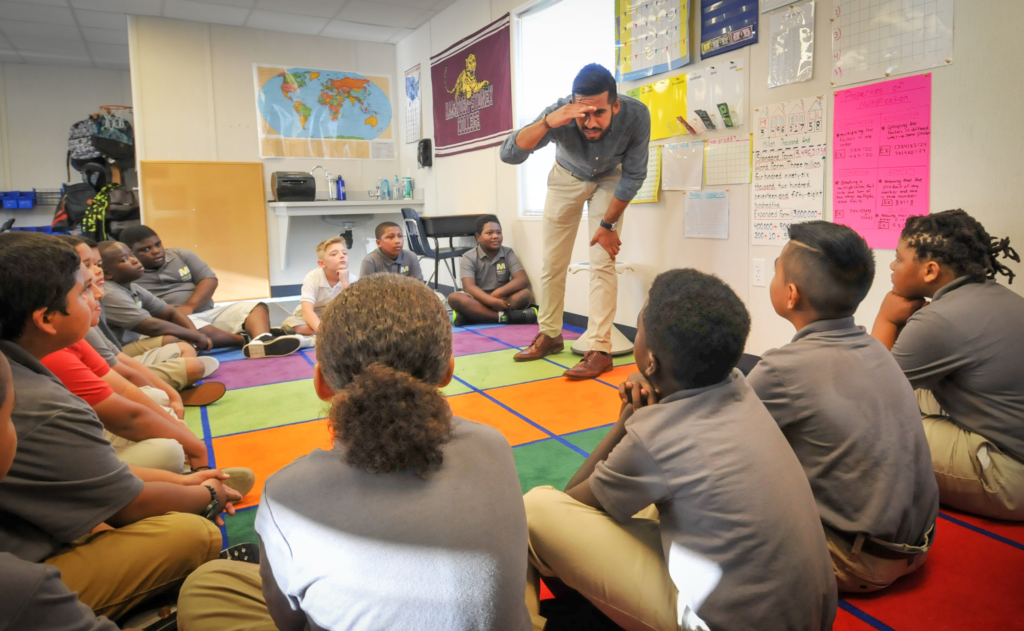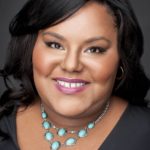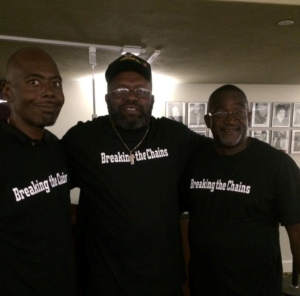
BRADENTON, Fla. – Odessa Ammons was looking for a school where her son could receive individualized attention.
She hoped Jeremiah, a quiet and withdrawn kid, would find his passions.
When he began school at Visible Men Academy, Ammons said, her son came alive. The small groups and close attention from teachers at the all-boys charter school helped him improve academically.
“There were little things they pulled out of him,” she said with a laugh. “He started writing poetry. He started wanting to draw.”
School officials say Jeremiah’s story is an example of how the Academy uses a variety of methods to meet the kids where they are while pushing growth. This has been proven to improve student achievement at the Academy, school officials said.
Visible Men Academy opened four years ago in Bradenton, a mid-sized city sandwiched between Sarasota and St. Petersburg on Florida’s Gulf Coast. It has glistening beaches to the west and a massive master-planned community to the east. But in the middle, there are pockets of poverty.
The school is devoted to helping boys like Jeremiah thrive. Roughly 90 percent of its nearly 100 students are black, and nearly all are considered economically disadvantaged.
It’s overcome difficult odds. In its first two years, it struggled with an F. Typically double-F charters have to close, but it was held harmless the first year, as Florida moved to new standardized assessments. Then, this year, however, it jumped two letter grades.
Administrators say a combination of strong leadership and new practices helped the school earn its first passing grade. It brought in a new principal. It embraced personalized learning. It started tailoring instruction to students’ individual needs and interests. It shifted students into groups based on their academic performance, allowing them to advance to higher levels of learning based on their mastery of the topic, rather than the amount of time they spend.
Mary-Luisa Berges, who is starting her second year as principal, said the school will assess each student quarterly, if not sooner, to help gauge where they are struggling — and where their school can help them improve.
Leadership

Neil Phillips, the academy’s CEO, said Berges played a significant role in the school’s improvement.
“She was part of overhauling our entire approach to academics and really helped us establish a new high-achievement culture around our academic landscape,” Phillips said.
Berges’ academic pedigree includes some A-list education reform organizations. She previously worked as assistant principal at Rocketship Alma Academy in San Jose, California and as a teacher at KIPP public charter schools.
“These are hallmark education agencies, centered around helping students from our demographic perform at significantly higher levels,” Phillips said of Rocketship and KIPP.
Phillips said Berges has helped teachers understand that collecting data on a quarterly basis isn’t what matters. What matters is how they use that data to help their students grow academically.
“We think it is a big part of the future of having success from our demographic,” Phillips said. “We have been much more willing to customize the delivery of our academic programs. It is not one-size-fits-all.”
Berges said when she took the job at VMA, its character and social education were already solid. She emphasized individualized, data-driven instruction, which was key to increasing its success.
SHINE
Visible Men Academy’s motto has always been “Let your light shine.”
School officials said they believe good character is as important as academic achievement. The core virtues it teaches its students are emblazoned on the walls of the school: Selflessness, Honesty, Integrity, Niceness, and Excellence.
“We call it shine saturation,” Berges said. “It is in the culture and the vernacular. Are you shining today? We are constantly using our SHINE principles in our vocabulary. It is a huge part of the school, teaching them what the principle means.”
The school says its purpose is to provide boys from low-income communities with a social education and academic character.
Dawnyelle Singleton, director of staff for VMA, said many students arrive with limited educational foundations.
“Most studies show students of color can have a significant vocabulary deficit,” she said. “The effects of poverty, language barriers and access barriers are what our kids predominately face.”
Berges said the school has hired a full-time social worker to work with the children.
“Our social workers are great at helping our students channel and recognize their feelings,” she said. “If we can get the character, social skills and behavior in control then everything else will fall in line.”
When students get out of line, VMA’s social workers often ask them one question: Were you showing integrity there?
Curriculum
Sitting in the cafeteria, one student did not want to focus as he sat with his teacher going over problems. His teacher nudged him to focus on the text and kept repeating herself several times until he settled down.
The school works to instill good study habits. For teachers, persistence is often key, Berges said. “We won’t stop until we get them to do the work with excellence. Our key to success is our fundamental love for our boys and our willingness to do whatever it takes.”
For one hour a day, the school groups students into classes for targeted interventions. For example, a kindergartener, first-grader and second-grader could be in one group based on their test scores at the beginning of the year, Berges said. The school routinely reassess these groups and moves students accordingly.
“Whatever that data tells us, we will adjust our practices based on that,” she said. “It is data-driven instruction.”
Parent participation

School officials say it is critical to get parents involved in helping children succeed.
For that reason, Visible Men Academy offers programs and incentives to encourage them to become more active in their students’ education.
Every Tuesday night, parents can take different classes such as wellness goals, counseling, cooking, financial empowerment, among others.
“We listen to our parents,” Berges said. “Our front office is always open. Everything is really personal. We know every kid by their name.”
And the response has been positive, with 50 percent of parents participating in the school’s programs.
Cedric Hameed, the arts coordinator and associate teacher, leads a fatherhood initiative group to encourage responsible parenthood.
“We talk about different issues that we have as fathers and men,” Hameed said. “We look at our relationships from our current standpoint to how we were raised and connect the dots in between.”
Hameed, a poet, also leads a parent theatre troupe in partnership with Van Wezel Performing Arts Hall in Sarasota. Parents are then able to perform in theater productions.
“It is another way to give parents a voice,” Hameed said. “It gives us that bridge to connect not only to the student but to the family and ambitions. They jump into each character themselves. They have the whole lens and inspiration they need to recreate unresolved issues. They are able to trade their insecurity for confidence and the fact they are able to impact people.”
Berges said she has faith the school will continue to grow because “we have an unending belief in the potential of our families and kids.”


